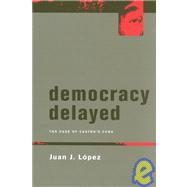Democracy Delayed : The Case of Castro's Cuba
, by Lopez, Juan J.- ISBN: 9780801870460 | 0801870461
- Cover: Hardcover
- Copyright: 11/15/2002
With the dissolution of the Soviet Union, foreign policy analysts and international relations scholars expected communist Cuba to undergo transitions to democracy and to markets as had the Eastern European nations of the former Soviet bloc. But more than a decade after the fall of the Berlin Wall, Castro remains in power, with no sign that the Cuban government or economy is moving toward liberalization. In Democracy Delayed, political scientist Juan Lopez offers a searching and detailed analysis of the factors behind Cuba's failure to liberalize. Lopez begins by comparing the political systems of three Eastern European states--the former German Democratic Republic, Czechoslovakia, and Romania -- with that of Cuba, in order to identify the differences that have allowed Castro to maintain his hold over the government and the economy. Lopez also shows the various conditions promoting change, including the development of civil society groups in Cuba, and discusses why some U.S. policies help the possibility of democratization in Cuba while others hinder it. While the Catholic Church in Poland and the Protestant Church in East Germany fostered change, the Catholic Church in Cuba has not taken a defiant stance against authoritarianism but seems instead to be biding its time until Castro is out of the picture. In conclusion, Lopez argues that a political transition in Cuba is possible even under the government of Fidel Castro. Some necessary conditions have been missing, but it is possible that U.S. policies could lay the groundwork for democratic charge.






